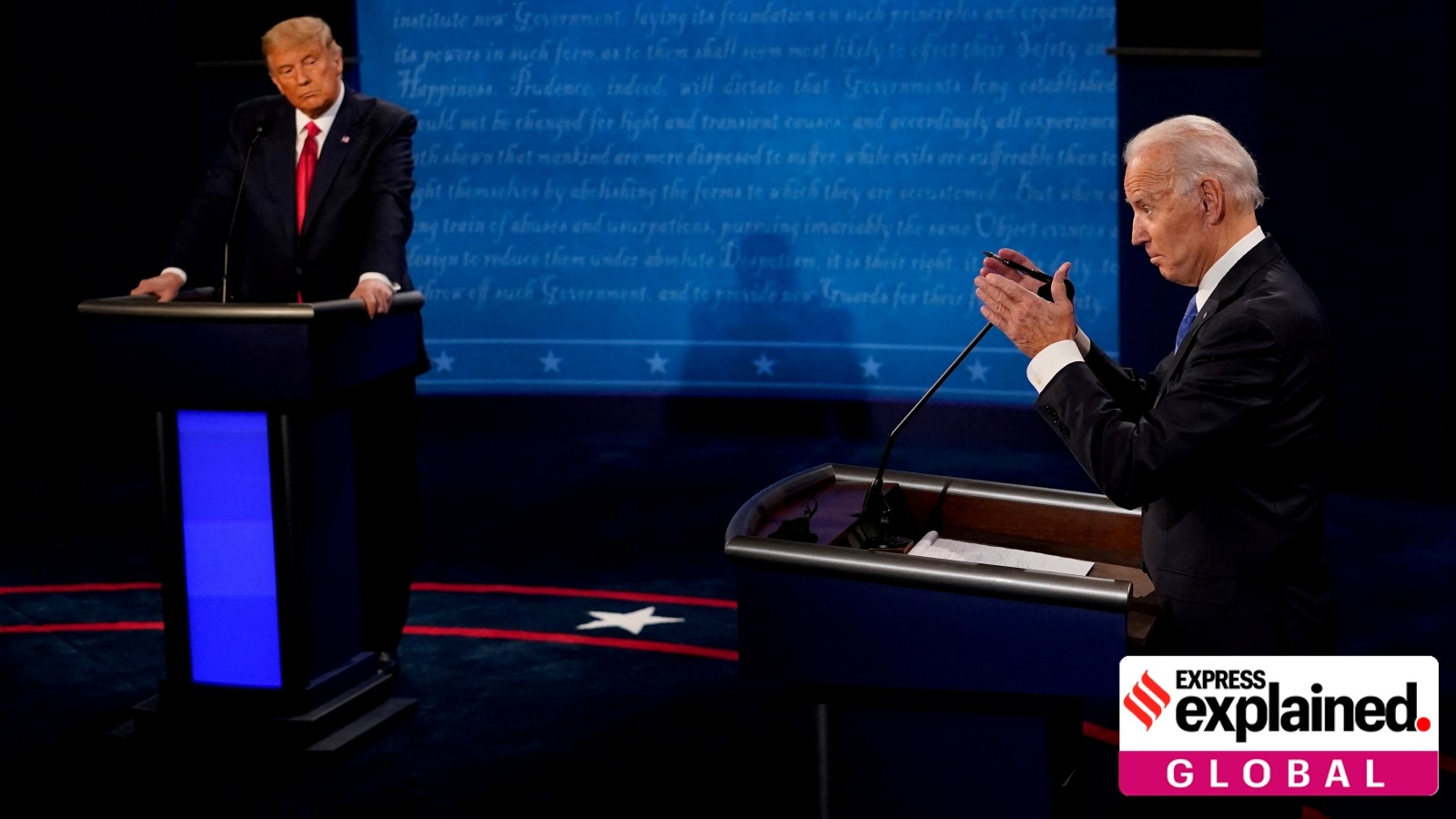5 things to watch for in the first Biden-Trump presidential debate on June 27
Incumbent Democrat Joe Biden will face of against Republican challenger Donald Trump in a televised debate on Thursday night. Here are 5 things you need to watch out for.
 Biden (right) and Trump on stage during the final debate of the 2020 elections. (Morry Gash/REUTERS/File)
Biden (right) and Trump on stage during the final debate of the 2020 elections. (Morry Gash/REUTERS/File)The very first televised debate ahead of the United States’ November presidential elections will take place on June 27. With incumbent Democrat Joe Biden, and his Republican challenger Donald Trump virtually tied in national opinion polls, the spectacle of televised debates, and the talking points they will provide for the media and politicians alike, may end up swinging many a voter.
Here are 5 key things to watch out for, ahead of next Thursday’s debate on CNN.
- 01
Candidates’ mental state
Biden, 81, and Trump, 78, are the two oldest candidates ever to run for the US presidency. Both face questions about their fitness to serve as President. Biden and democrats call Trump “unhinged” and a threat to democracy. Trump’s tendency to go off on extended tangents, and occasionally mixing up names (he misidentified Biden as former President Barack Obama) have raised plenty of eyebrows.
But polling seems to suggest Biden’s age, and mental and physical competance are among top concerns for voters. Critics say he is slowing down, and point to a series of verbal slip-ups during his tenure. Trump too has repeatedly mocked Biden, calling him senile, and coining the catchy “sleepy Joe” moniker.
- 02
Test of tempers
Both Biden and Trump are known for their tempers and impatience. Trump may use Biden’s son Hunter to get under the president’s skin. Hunter was recently convicted of lying about his drug use to illegally buy a gun. While Biden is used to such attacks, viewers will see if he can maintain his poise under fire.
Trump too has to be careful, so as to not to turn off moderate voters by being a big, bad bully. “You can’t be so aggressive that you are rude, and you seem to be trampling your opponent,” Brett O'Donnell, a veteran Republican debate consultant, told Reuters.
- 03
Disinformation during debate
Trump is notorious for propagating falsehoods in his speeches and remarks. Biden, too, has been known to tell some tall tales. The debate is likely to feature more than one false claim from either man. But there is peril for the opposing candidate to try to correct the record on stage, as there is very limited time.
Rather, the task of fact-checking will be left to the presidential hopefulss’ campaign aides who can quickly send out statements challenging the opponent’s assertions. News organisations will also be doing the same.
- 04
Setting the right narrative
Both candidates will likely have some key points with which they will try and hammer their opponent. For Biden, there will be a strong temptation to lean into Trump’s recent conviction in New York. But this comes with a risk, as Trump has constantly (and without proof) claimed that he is a victim of Biden’s political persecution. Trump will have to balance being outspoken and appearing as a “threat to democracy”, as Biden has repeatedly suggested.
Experts say that the candidates should emphasise on voters’ issues rather than on each other, to show that they are in sync with the electorate. For Biden, it will be crucial to not come off as too boastful of his accomplishments with regards to the economy and cost-of-living. As Democratic pollster Brad Bannon put it: “He must couple his boast of accomplishments with an acknowledgement that consumers still struggle with high prices for gas and groceries”.
- 05
Dealing with no audience
In a sharp departure from previous presidential debates, there will be no studio audience, and thus, no real-time feedback. That could pose problems for both candidates, but perhaps particularly for Trump, who draws energy from a boisterous crowd.
Another danger for Trump: CNN has said a candidate’s microphone will be turned off to prevent interruptions when the other is speaking. Trump may decide to try to be heard anyway, risking alienating some viewers in the process. A key to debate success may be which candidate makes the format work best by connecting viscerally with viewers at home.
(With inputs from Reuters)
- 01
- 02
- 03
- 04
- 05






































